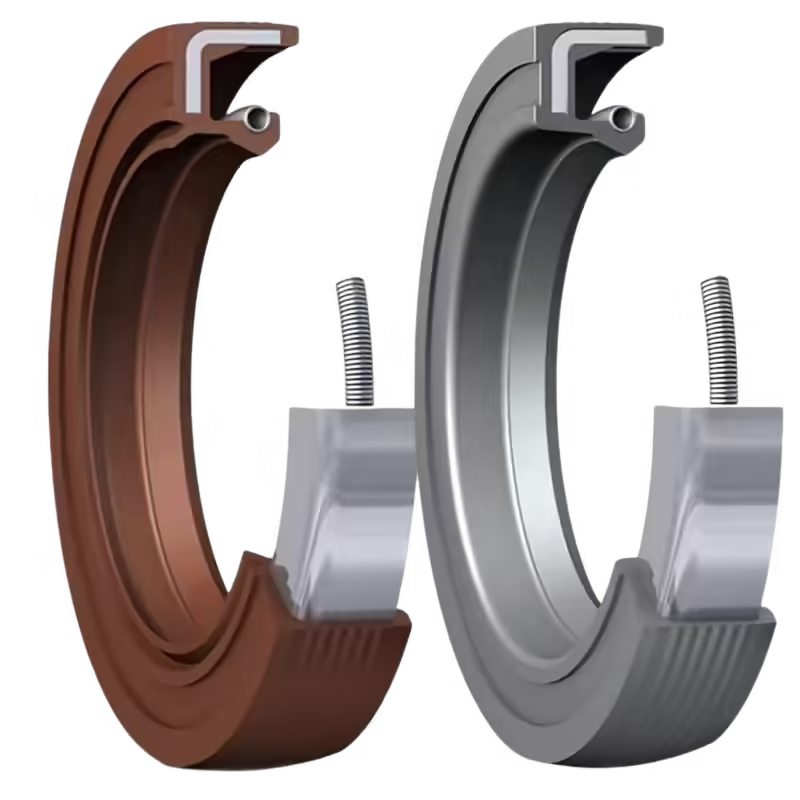Rotary Tiller Shaft Oil Seal: TC vs. MC Split-Type Combination Seal
1. Introduction
Oil seals play a pivotal role in the efficient operation and longevity of rotary tillers. These components are essential for maintaining lubrication within the tiller’s moving parts while preventing the ingress of contaminants that can cause wear and tear. Among the various types of oil seals utilized in agricultural machinery, TC (Tongtong Corporation), TG (Tongtong General), and MC (Multi-Component) split-type combination seals are the most prevalent. This article aims to provide a comprehensive comparison between TC/TG oil seals and MC oil seals, specifically within the context of rotary tiller shaft applications. Understanding the differences and advantages of each seal type is crucial for selecting the most appropriate solution to ensure optimal performance and durability of rotary tillers.
2. Understanding TC and TG Oil Seals
Definition and Function
TC and TG oil seals are specialized components designed for use in rotary tillers. These seals are engineered to protect the tiller’s internal components by preventing contaminants such as dirt, dust, and debris from entering the system while simultaneously retaining essential lubricants within the rotating shafts. By maintaining a clean and lubricated environment, TC/TG seals significantly enhance the operational efficiency and lifespan of rotary tillers.
Mechanism
The operational mechanism of TC/TG oil seals involves an inner lip that rotates in tandem with the shaft. This rotational movement can lead to wear on the sealing lip over extended periods. To mitigate this, TC/TG seals are crafted with precise design and material composition. The use of high-quality rubber compounds ensures that the seals maintain their integrity and functionality, minimizing wear and tear on the shafts. This careful engineering ensures that the seals provide a reliable barrier against contaminants while effectively retaining lubricants.
Advantages of TC/TG Oil Seals
- Durability and Efficiency: TC/TG oil seals are renowned for their robust performance and longevity. Their design ensures consistent sealing efficiency, which is critical for maintaining the operational integrity of rotary tillers.
- High-Quality Materials: These seals are made from premium rubber materials that offer resistance to wear and environmental factors, ensuring long-lasting service even under demanding conditions.
- Minimal Shaft Wear: The high rubber content combined with low filler materials in TC/TG seals reduces the friction and wear on the shafts, enhancing the overall durability of the rotary tiller.
Applications
TC/TG oil seals are predominantly used in agricultural machinery, with a particular emphasis on rotary tillers. Their ability to maintain effective sealing in high-stress environments makes them ideal for applications where reliability and performance are paramount.
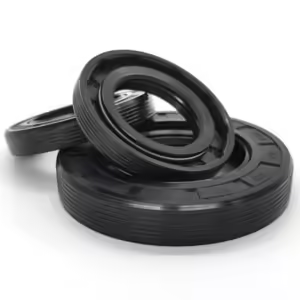
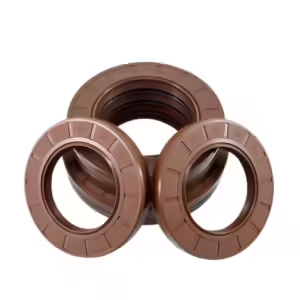
3. Understanding MC Split-Type Combination Oil Seal
Definition and Function
The MC split-type combination oil seal represents a more recent advancement in sealing technology. Unlike traditional seals, the MC oil seal features a split-type design that allows for easier installation and adaptability to various shaft sizes. These seals are specifically utilized for protecting spline shafts, especially within rotary tiller gearboxes, where precise sealing is essential to prevent lubricant leakage and contamination ingress.
Mechanism
MC oil seals operate through a unique mechanism where the inner diameter of the seal fits tightly around the shaft, while the outer diameter remains stationary relative to the gearbox housing. Between these two diameters, a rotating friction block facilitates smooth operation. This design ensures that the seal maintains its integrity by minimizing direct contact between the rotating and stationary components, thereby reducing friction and wear.
Advantages of MC Oil Seals
- Protection for Spline Shafts: One of the standout features of MC oil seals is their ability to protect spline shafts effectively. This is particularly advantageous in reducing mechanical wear and extending the lifespan of the shafts.
- Innovative Design: The split-type combination design of MC seals allows for greater flexibility and ease of installation, accommodating a range of shaft sizes and configurations.
Challenges with MC Oil Seals
- Sealing Efficiency: While MC seals excel in shaft protection, they typically offer lower sealing efficiency compared to TC/TG seals. This can result in a higher susceptibility to lubricant leakage and contaminant ingress.
- Contaminant Prevention: MC seals are less effective at preventing the entry of contaminants, which may lead to increased wear and potential damage to internal components over time.
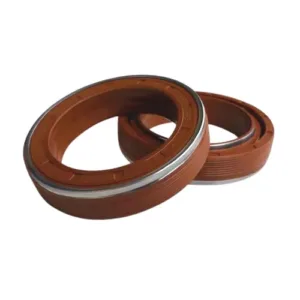
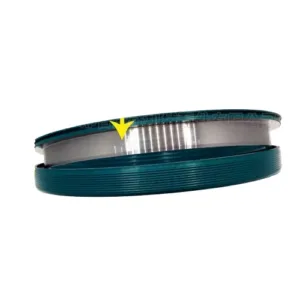
4. Comparison: TC/TG Oil Seals vs. MC Oil Seals
Sealing Efficiency
TC/TG oil seals outperform MC seals in terms of sealing efficiency. The continuous lip action of TC/TG seals ensures a more effective barrier against contaminants and lubricant leakage, providing long-term sealing performance that is essential for the reliable operation of rotary tillers. In contrast, MC seals, while offering adequate protection, do not match the same level of sealing efficacy.
Shaft Protection
MC oil seals are specifically designed to minimize damage to spline shafts, making them a superior choice for applications where shaft protection is the primary concern. This feature is particularly beneficial in reducing mechanical wear and extending the operational life of the shaft. On the other hand, TC/TG seals also cause minimal wear on shafts, thanks to their high-quality rubber composition and efficient design, though their primary advantage lies in sealing efficiency rather than shaft protection.
Durability
In terms of durability, TC/TG seals generally have an edge over MC seals. The superior sealing properties of TC/TG seals contribute to their longer lifespan and fewer issues related to wear and tear. MC seals, while effective in their protective role, may experience shorter operational lifespans due to their comparatively lower sealing capabilities.
Cost and Availability
TC/TG oil seals are widely available and have been a staple in the market for agricultural machinery, making them a cost-effective option for most applications. Their widespread use ensures easy availability and competitive pricing. Conversely, MC oil seals are a newer innovation and may not be as readily available. Additionally, their advanced design and specialized functionality can result in higher costs, potentially making them a less economical choice for some users.
5. Choosing the Right Oil Seal for Rotary Tillers
When selecting the appropriate oil seal for rotary tillers, several factors must be considered to ensure optimal performance and longevity:
- Application Type: Determine whether the seal will be used in a gearbox, spline shaft, or other specific components of the rotary tiller.
- Desired Level of Protection: Assess whether the primary need is for sealing efficiency, shaft protection, or a balanced combination of both.
- Operating Conditions: Consider the environmental factors such as temperature, pressure, and exposure to contaminants that the seal will encounter during operation.
When to Use TC/TG Oil Seals
TC/TG oil seals are ideal for scenarios where sealing efficiency and minimal shaft wear are critical. They are best suited for applications that demand high-performance sealing to prevent lubricant leakage and contaminant ingress, ensuring the reliable operation of rotary tillers over extended periods.
When to Use MC Oil Seals
MC oil seals are the preferred choice for applications where shaft protection is the foremost concern. They are particularly effective in safeguarding spline shafts within gearboxes, making them suitable for environments where mechanical wear on shafts needs to be minimized, even if it means compromising slightly on sealing efficiency.
6. Conclusion
In summary, TC/TG and MC split-type combination oil seals each offer distinct advantages tailored to specific needs within rotary tiller applications. TC/TG seals excel in sealing efficiency and durability, making them the go-to choice for maintaining lubricant integrity and preventing contaminant ingress. On the other hand, MC oil seals provide superior protection for spline shafts, reducing mechanical wear and extending the lifespan of critical components. Selecting the right oil seal involves balancing the priorities of shaft protection and sealing efficiency based on the specific operational requirements of the rotary tiller and its gearbox. By making an informed choice, users can ensure optimal performance and longevity of their agricultural machinery.
Contact Information
For more information about high-quality rotary tiller oil seals, please visit our website at drorubber.com.
- WhatsApp: +0086 15815831911
- WeChat: +0086 13784044874




